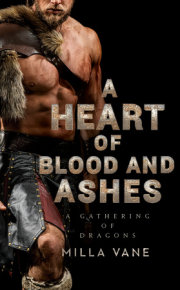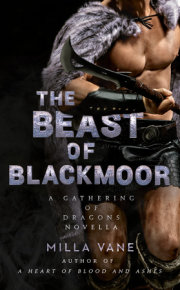Chapter 1
Lizzan
Many an innkeeper had woken Lizzan by tossing a bucket of water into her face. This day marked the first time she was doused awake by a tree.
She sat up sputtering and squinting beneath the morning sun. Or perhaps it was the midday sun. The source of the light filtering through the jungle canopy was too high for morning, and far too bright for eyes unshaded by sobriety. Judging by how it blinded her, she was nearly sober.
A sad state that Lizzan would soon remedy.
Of late, her flask was always as near to her hand as her sword. She uncorked the neck and was doused again when another broadleaf overfilled with rain and tipped out its burden.
The deluge poured over the top of her head. Sputtering again, her black hair hanging around her face, Lizzan contemplated the effort of leaving the base of the tree where she'd made her bed. All around her, the canopy dumped water as if making wet war on the world below. She would be no drier if she abandoned this spot.
And she would be no drunker unless she did. Only a few drops remained in her flask-and those tasted of rainwater.
Groaning, she shoved the cork into the neck. A fine day this was. Such a very fine day.
Whatever day it might be. The last she remembered, her flask had been full. Usually at least two or three evenings passed before she had to fill it again.
Head pounding, she unsheathed her sword. Bits of vegetation stuck to the blade, as if she'd hacked her way through the jungle foliage, but no blood stained the shining steel. She had not likely killed anyone in the time unremembered, then, or the blood would still remain. Lizzan was not the tidiest of warriors when drunk.
And now she was here. Beneath a tree. She had the vaguest recollection of a man with a gray curling beard saying that a band of thieves plagued the road between Ebrana and Oana. Perhaps she'd set out to hunt them.
If so, then a fool she was. Gladly would Lizzan collect bandits' heads. But she had no money and no horse-and now, no drink. Better to have waited until someone offered to pay for those heads.
At least her only foolishness had been chasing after brigands. She was still in possession of her purse-empty though it was-and her sword, which would fill the purse with coins again. She had not sold any more of her armor. Even with the sigil of the Kothan army scratched away, each piece was fine enough to fetch a fair price. Her mail tunic alone could buy a horse and a year's worth of drink. But she was not yet so desperate. Or so thirsty.
A sniff told her that she also possessed a rather unpleasant odor. But the rain would take care of that.
Mostly.
Her leathers and boots were sodden when the storm finally passed. Made from a northern falt's water-shedding pelt, her bedroll had been spared the soaking but was so muddied that nothing of the white fur could be seen under the brown. The cursed heat in this realm would dry them all soon enough, but still she stripped down to her underlinens and boots before starting out in search of the road, so that her squelching would not draw predators-whether human or animal-and to spare herself the chafing.
Some days it seemed that everything chafed. Not only what she touched. But all she heard, all she saw. All of it rubbed the wrong way. Yet only her clothes left blisters.
Soon she would remove her boots, too. Wet boots always meant lost toes-in the north, lost to frost; in the jungle, lost to rot. Yet she would wait until the road before taking them off, when she would be less likely to step on a venomous snake or a stinging vine.
Finding the road was a simple matter of following the path she'd slashed through the foliage. She slowed when the sound of voices told her that a group of travelers was already upon it.
Out of sight amid a heavy growth of ferns, Lizzan studied the procession. A few dozen families-men and women, young and old. A handful of carts drawn by oxen carried supplies and the weaker among the travelers, but most walked.
Except for the mounted figure at their head. From this vantage, Lizzan could not see her face, but the red cloak she wore identified her well enough. A Nyrae warrior-or so she would have everyone believe by wearing that cloak. Once, those roaming warriors guaranteed the safe passage of anyone who traveled the road with them, for only a fool would attack one of the goddess Vela's chosen. But few Nyrae warriors had survived Anumith the Destroyer's deadly march a generation past. Now, it was more likely a woman from the caravan had donned a crimson cloak in hope that bandits would not risk attacking a party led by a true Nyrae warrior.
The deceptive practice had become so common, however, that there was little protection in it anymore. Instead those who could afford the cost hired guards-which was how Lizzan earned most of her coin. She escorted merchants and nobles fleeing east, as rumors spread of the Destroyer's return from the west. From the east, she escorted merchants and nobles fleeing west to escape the tyranny of the warlords in Lith. And from the north came those fleeing unnamed terrors that haunted the ice and snow.
From every direction, everyone was fleeing some danger-only to find there was nowhere safe to go. So most remained in Krimathe, where the Ivory Throne offered protection to all who sought refuge. Those who didn't stay in Krimathe continued fleeing south.
This was the first party she'd seen fleeing north. Usually the only escort in that direction was for merchants' goods, which were a prime target for bandits. More than all else, the destitution of these travelers might be better protection than any red cloak. They had little to tempt thieves.
Unfortunately, thieves were often tempted by very little.
A few stragglers made up the tail of the caravan-likely those who had joined the group after it had already started out, for it was Vela's law that no one would be denied a Nyrae warrior's protection upon the road. Even if that warrior was in truth a farmer, she would not chase away the stragglers and risk her disguise.
Lizzan waited for the entire procession to pass, then caught up to straggle after the stragglers. With her sodden hair hanging over the left side of her face, armor and leathers wrapped up in her bedroll, she received little more than a curious glance or two from the others, and she remained far enough behind to escape any attempts at conversation.
But she did not escape notice. Lizzan had barely settled into the procession's slow pace when the quick tempo of hoofbeats announced the approach of the red-cloaked figure.
Oh, and no farmer was she. Not on a horse so fine. Sheer envy struck Lizzan's chest. Perhaps she would part with her mail tunic, after all.
Except this woman did not need Kothan armor, though she hardly wore any of her own. She was not a large woman, shorter than Lizzan and more finely boned. A thick braid swept her black hair away from the proud set of her face. Lizzan had never laid eyes upon that face before but had little doubt of the woman's identity. Lizzan could not step into a tavern without hearing of how Krimathe's future queen had set out on the sacred quest that would earn her the Ivory Throne-and all who quested for the goddess Vela also wore a red cloak.
But the woman eyeing her now was no mere princess. Legend was that Hanan had fucked one of her foremothers. Now that god's silver blood ran though her veins and his strength through her limbs.
So Lizzan felt a bit of a fool when she said to the woman, "I was told that bandits prey the length of this road. I offer my sword and assistance if we happen upon them."
The woman's dark eyes swept Lizzan from drenched head to wet toe, and Lizzan did not think that piercing gaze overlooked a single scar or battle-hardened muscle.
No response did she give, except to cock her head-as if waiting for more.
Lizzan sighed and scratched the side of her neck. "I would not ask these people for payment . . . but if the bandits are mounted, I would like first pick of their horses."
The Krimathean's eyes narrowed. As if she knew there was more.
And so there was. "Also their flasks."
The woman's lips twitched. Then she swept her forefinger over her left eyebrow.
Lizzan's chest tightened. Yet she could see no way around it. Had she still been in the north, or if it were winter, no one would think anything if she'd covered much of her face. Yet if she'd joined this procession wearing the mask she often used while working, she'd have immediately been thought a bandit. And her hair had not concealed her well enough.
With muddied fingers, she drew back the black strands, revealing the scars that raked down the left side of her face.
"Though it looks similar, it is not Vela's mark," she said thickly. "I am not cursed."
Of all people, this woman might know. If the Krimathean failed in her quest for Vela, she would bear that goddess's mark-and be shunned by all. Driven from every village and city to live forsaken and alone. A woman to whom even a Nyrae warrior would not offer protection.
With the tip of her finger, the Krimathean drew a line down the outside of her cheek from hairline to jaw.
Relief lightened Lizzan's heart. That line was where another scar would have been, had she borne Vela's mark. So this woman must have seen it before. So many others had not. And Lizzan had often known the weight of the curse that she hadn't earned.
She had been cursed. And shunned. But not by a goddess. Instead a bastard prince had been the one to steal everything from her. Her rank. Her honor. Her heart.
Oh, and now that she'd thought of him, everything chafed again, and her sword thirsted for blood. For not all thieves skulked in the forests. Some lived in crystal palaces.
But if bandits were to ambush her here . . . they would serve as a fine substitute.
The ambush came not from bandits, but from LizzanÕs fellow travelers when the caravan stopped for a midday rest.
In a clearing bordered by a stream, Lizzan laid out her belongings to dry, then sought shade beneath a giant fern. Her head ached madly. The sun in this realm was never as bright as during a northern winter, where Enam's glare upon the ice and snow dazzled and blinded, but the god's eye burned so cursedly hot here that shade brought scant relief. And although she'd filled her flask with rainwater, every swallow seemed to immediately spurt from her skin as rivers of sweat, and her thirst never eased.
So it was there beneath the fern, in her barefoot and vulnerable state, that they ganged up on her in a party of three-an elderly woman, a younger woman, and a still younger man who was hardly more than a boy.
Through slitted eyes, Lizzan watched them approach. No fear did they seem to have of the disagreeable scowl she wore-and no respect did they seem to have for the sheathed sword lying across her lap. Probably because they were all under the protection of a Krimathean warrior who could crush Lizzan's skull between her bare hands.
In truth, it was only because of the Krimathean's presence that Lizzan had allowed herself to be in such a vulnerable state. Now she prepared to be ousted from the caravan despite the law of the road. Many ways there were to make a person feel unwelcome, until leaving a place was not forced but the person's own choice. Lizzan was familiar with most of those ways.
She sneered at most attempts to oust her. Unless her presence made these travelers feel unsafe.
Never could she stay if they did.
Under the bright sun, the older woman's snow-white hair was hard to look upon-and too similar to everything that Lizzan had left behind, yet would not lie still and unremembered in her mind.
Instead Lizzan focused on the other woman, who resembled the elder so fiercely that a family connection could not be mistaken. Solidly built, she wore her brown hair plaited into a simple braid that draped over her shoulder, with sweat-dampened tendrils curling at the edges of a round face. Her pale green tunic and loose brocs appeared homespun, yet lighter and of finer quality than Lizzan's linens-and though more of her brown skin was covered, the woman seemed less discomfited by the sweltering heat than Lizzan was.
She carried no weapons. Lizzan suspected she didn't need them. When the procession had passed earlier, this woman had walked near the head, and she had the air of a leader who could rouse a village-or a caravan-to action with a few words.
Years past, that was the sort of woman Lizzan dreamed of becoming-though she would have led an army, not a village. But that dream was dead. As were her soldiers and any future she'd once imagined.
Now Lizzan silently returned the woman's regard, chin lifted and her scars partially exposed, daring the woman to shun her for them. The Krimathean had already accepted Lizzan into the caravan. Only if the goddess Vela flew down from the moon to cast judgment upon the markings would any opinion carry more weight. They likely still made this woman uneasy.
Yet no unease did Lizzan see when the woman gestured to her drying bedroll and asked, "Is that the hide of a northern falt?"
"It is not for sale."
Though she should sell it. The hide had once promised everything but now meant nothing. Lizzan should abandon it as easily as a bastard prince had abandoned her. But Lizzan could not.
Which did not make her entirely a fool. Like her mail tunic, which had also once meant everything to her and now meant nothing, the hide was useful.
The woman made a dismissive gesture, as if acquiring the valuable pelt had never been her intent. "You have spent time in the north?"
The pounding in Lizzan's head worsened. "I have."
"How far do you travel now?"
"Only as far as my next job demands."
"Have you one?"
"Not as yet." Lizzan's eyes narrowed with dry amusement. "Do you have need of another escort with a sword? It would be coin well spent. For certain, a Nyrae warrior with a god's blood in her veins isn't protection enough."
Copyright © 2020 by Milla Vane. All rights reserved. No part of this excerpt may be reproduced or reprinted without permission in writing from the publisher.






